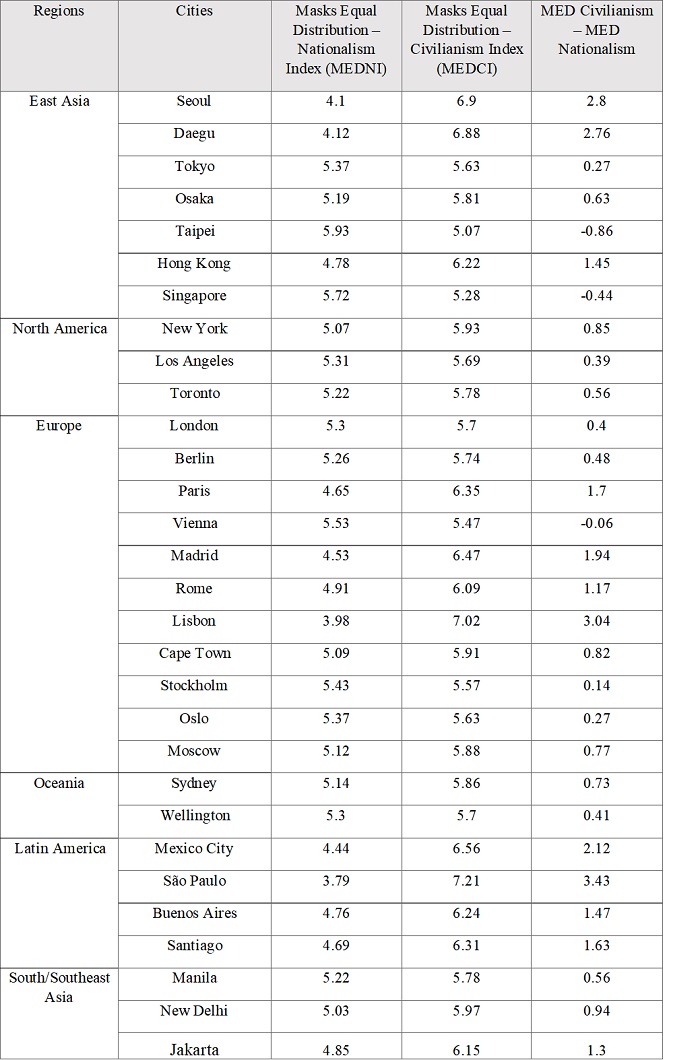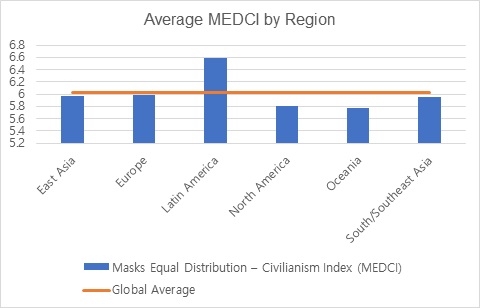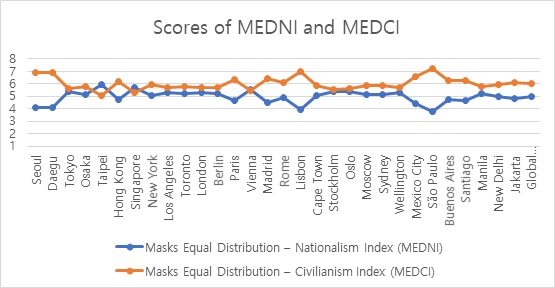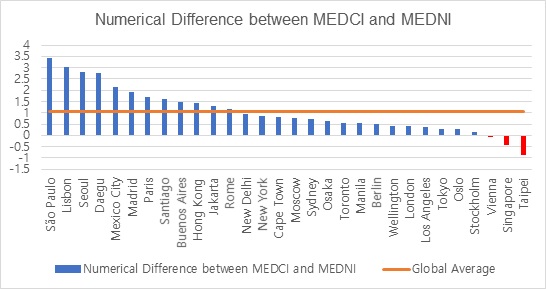Impact of a Face Masks Equal Distribution policy during
the COVID-19
1.
Background
COVID-19
data analysis 5 series will focus on how emergency measurements during the
COVID-19 influence the nationalism around the world. To illustrate, we will
analyze the survey results of opinions of global citizens whether they perceive
a certain policy will lead a country to nationalism or citizens’ cooperation.
International cooperation is occasionally disturbed by countries with strong and
offensive nationalism, and sometimes, even a central government cannot control
the national outrage triggered by nationalistic sentiment. Even worse,
irrational nationalism would bring about racism and xenophobia, which severely
undermines the free and open market around the globe. On the contrary,
cooperation among citizens and governments would enhance the effectiveness of
abating the crisis and it will help fast recovery from an emergency to everyday
life.
After
the COVID-19 outbreak, face masks consumption was soaring, resulting in
skyrocket price rising along with masks domination by some companies. The
phenomenon harmed normal economic activity and public health. Thereafter, some governments
initiated a mask policy, for instance, the South Korean government made a face
mask distribution policy, which took effect on March 9th, 2020. In
order to prevent a run on face masks, which have become a rare commodity in
drugstores nationwide as a result of the virus scare, the government imposed
new ruled on the distribution that mandate that each citizen can only buy two
masks per week and only after undergoing identity checks at drugstores.
2.
Research
Topic
In the middle of the COVID-19 pandemic, it
is of importance for a government to make a rapid measurement to fight against
the virus. However, it is also of equal significance to think of ramifications
of the emergency policies and people’s support. This section will analyze how
global citizens see the face masks equal distribution policy, especially how people
assess the policy’s influence on a country’s nationalism and civilianism during
the COVID-19 crisis.
3.
Questionnaire
Used
Survey Question II-7: “While fighting
against a global pandemic like COVID-19, a country may begin to follow either a
state-centric and chauvinist path, or a democratic path based on citizen
participation. In terms of a face masks equal distribution policy, what
direction do you expect the following policies/trends to take?”
The answers consist of a 10-point scale,
with higher scores indicating an individual believes the policy will lead
citizens to democratic/participatory citizenship and lower scores demonstrating
a person acknowledges the measure will result in citizens’
state-centric/chauvinistic.
4.
Major
Outcomes
Table 1: Masks Equal Distribution –
Nationalism Index (MEDNI) and Masks Equal Distribution – Civilianism Index (MEDCI)
by Citizens of 30 Global Cities

Respondents are asked to choose one score
to represent their ideas on the question, and the average scores of each city
indicate the Masks Equal Distribution – Civilianism Index (MEDCI). It demonstrates
that how much do citizens of a city consider the face masks equal distribution
policy will cause citizens’ cooperation and participation amid the crisis, and
the higher the score is, the more individuals think highly of the policy.
Meanwhile, the reverse scaling was used in the Masks Equal Distribution –
Nationalism Index (MEDNI), which means that 11 minus MEDCI is the MEDNI.
Similarly, the higher the MEDNI score is, the more a citizen speak ill of the
policy under the democratic and liberal principles. Finally, the numerical
differences between the two scores were calculated in order to show which side
a city is putting more significance. To illustrate, the higher a numerical
difference is, the more citizens of the city underscore the above-mentioned
policy in the course of the pandemic crisis.
Table 2: Average Masks Equal
Distribution – Civilianism Index (MEDCI) by Region
|
Regions
|
Average Masks Equal Distribution - Civilianism Index
(1 – 10)
|
|
East Asia
|
5.97
|
|
Europe
|
5.98
|
|
Latin America
|
6.59
|
|
North America
|
5.80
|
|
Oceania
|
5.78
|
|
South/Southeast Asia
|
5.96
|
The scores in the
table are the average Masks Equal Distribution
– Civilianism Index (MEDCI) of
the global citizens by region. To be specific, the lowest score of 5.78 was
rated by Oceanian citizens on average. It exhibits that people in this region least
likely to deem that the face masks equal distribution policy will have a
positive effect on civilianism compared to other regions in the world. On the
contrary, the highest score of 6.59 was rated by Latin American citizens, which
illustrates that people here are most likely to highlight a certain policy and
believe the measurement would lead to citizens’ cooperation in society.
Nevertheless, all regions MEDCI scores are very high since all the scores are
higher than the median score of 5.50.
Figure 1: Bar Graph of Average Masks
Equal Distribution – Civilianism Index (MEDCI) by Region

Figure 1 is the
visualized graph of Table 2, and the orange line is the world average Masks
Equal Distribution – Civilianism Index (MEDCI). Latin American citizens think very positively about
the mask distribution policy is evidenced by the figure. These are generalized
scored by region, and therefore, for more detailed analysis, let’s see each
city’s score of MEDCI and MEDNI.
Figure 2: Line Graph of Masks Equal
Distribution – Nationalism Index (MEDNI) and Masks Equal Distribution –
Civilianism Index (MEDCI)

This figure is a visualized version of
Table 1, and the most
outstanding finding of Figure 2 is that MEDCI scores of all cities, except
Taipei, Singapore, and Vienna, are higher than MEDNI scores, illuminating that
almost every city citizens are showing a positive attitude toward the mask
distribution policy. They believe the face masks equal distribution policy
would lead cooperation among citizens nationally and globally. By contrast,
citizens in Taipei, Singapore, and Vienna hold that the policy may lead
citizens to state-centric and nationalism, and subsequently hampering collaboration
during and after the COVID-19 era.
Figure 3: Bar Graph of Numerical Difference
between Masks Equal Distribution – Civilianism Index (MEDCI) and Masks Equal
Distribution – Nationalism Index (MEDNI)

The differences
between MEDNIs and MEDCIs are drawn as a bar graph, shown in Figure 3. The orange
bar indicates the global average difference score (1.06). Cities with negative
numerical differences are marked with red bars, indicating citizens of that
city believe that the face masks policy will lead a country to nationalism and
prevent cooperation among people and countries; yet, cities with blue bars
express that the masks policy is effective in a way of stimulating the
cooperation and participation on preventing the further spread of the
coronavirus.
5.
Summaries
and Further Tasks
a.
Generally
speaking, international society believes that the face masks equal distribution
will have a positive impact on cooperation and civilianism.
b.
People
in Taipei, Singapore, and Vienna think that the masks policy would lead citizens
to state-centric and nationalism, and subsequently obstruct cooperation during
and after the COVID-19. Except for these three cities, all global cities’
citizens reckon that the masks policy will positively influence civilianism and
encourage people to cooperate and participate in preventing further spread of
the virus.
c.
Latin
American average MEDCI is higher than the global average, indicating people in
this region think more positively on the mask equal distribution policy
compared to other regions around the globe.
d.
The
study is limited to descriptive research, and therefore, a more detailed
explanative investigation is required to further understand the global citizens’
consciousness presented above. For instance, why citizens in Singapore, Taipei,
and Vienna assume that the masks distribution policy may lead citizens towards
state-centric and nationalism? Are there any common traits among these
countries?
|